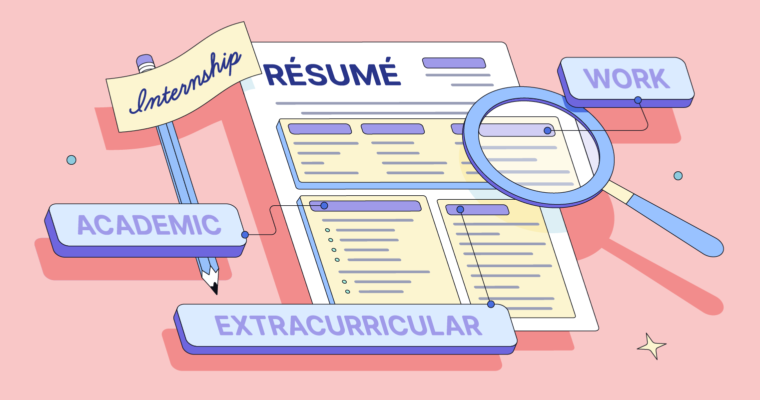
You’re ready to apply for your first job . . . but you don’t know how to write your résumé because you don’t have any experience yet.
In a job market that often emphasizes previous work, how you present yourself becomes crucial. When you don’t have experience, a standout résumé makes the most of your education, showcases relevant skills, and plays up your unpaid experiences.
Writing a résumé with no experience doesn’t have to be daunting. Here are five steps for filling out your résumé:
- Use an objective, not a summary, to convey your value and show your career goals.
- Play up your education by making it the first section.
- Instead of work experience, share internships, volunteer roles, projects, and extracurriculars in your relevant experience section.
- Make your skills stand out by including both soft and technical skills.
- Tailor your résumé to each specific job with keywords.
That’s just the overview. Let’s go through it step by step to create a winning résumé that’ll get noticed. We’ll start with the top of the résumé, your objective.
Write a résumé summary or objective
As someone with no experience, you’ll want to write a résumé objective rather than a summary. This is a concise five to seven sentences at the beginning of your résumé. It highlights qualifications, skills, goals, and experience that grab the attention of hiring managers. Quickly convey your value as a candidate and showcase why you’re the best fit for the job by focusing on your qualifications and career goals and aligning them with job requirements.
Your résumé objective should include the following:
- Areas of expertise
- Quantifiable accomplishments
- Relevant skill set
- Résumé keywords
Résumé objective example:
I’m a results-driven communications graduate seeking a social media manager position to leverage my academic background and project experience in creating impactful online campaigns. With a degree from Keene State College and a proven track record in executing four successful social media projects during my academic journey, I’m eager to apply my content creation, audience engagement, and analytics skills to contribute to your team. Committed to staying on top of the latest social media trends and platforms, I’m poised to bring fresh and innovative strategies to elevate your brand’s digital presence.
Include your education
Normally, your experience section would come first on your résumé, but because you don’t have a professional background yet, the next section moves up to fill the space: education. It’s one of your strong attributes, so let’s play it up!
Here’s what to add to your education section, in this order:
- Degree
- Institution
- Years attended
- Location
If you attended a prestigious university, your institution should go before your degree on this list. It’s a trick résumé writers have been using for decades to catch recruiters’ attention.
Now, if you want to make it a highlight of your résumé, you can include the following optional points:
- GPA
- Honors
- Relevant course or courses
- International programs
Résumé education example:
Bachelor of Arts in Communications Antioch University
2019–2023 Keene, New Hampshire
High School Diploma Moultonborough Academy 2014–2018 Moultonborough, New Hampshire
4 types of nonprofessional experience
For your first résumé, you don’t need a job to have experience. You can replace it with one or more of these options instead. Rather than putting a header that says “Work Experience” like a traditional résumé, we’ve included header recommendations for each of these options.
1 Internships
The most common replacement for job experience is internships. Use the header “Internship Experience” for this section. You can list your internships in this section the same way you would a traditional job.
For each internship you held, list the following:
- Internship title and role
- Company name, location, and duration of internship
- Responsibilities and accomplishments in bullet points
2 Volunteer work
While volunteering isn’t always as formal as an internship, it proves your work ethic to your future employer. Anyone who volunteers their time for something bigger than themselves will make a good employee. For volunteer positions, you can use that same header format, “Volunteer Experience.”
For each relevant volunteer role, list the following:
- Name of the organization
- Location, duration of commitment
- Relevant accomplishments or activities as a bulleted list
3 Projects
Projects can help round out your résumé, especially if your skills include coding, community-oriented work, or social media marketing. If you went to college, you probably have a project you can include on your résumé. This section should be titled “Projects.”
Here’s what to list for each project:
- The name of your project
- A few words describing the type of project
- The association, if you did the project for something specific
- When you did the project
- Achievements, results, and responsibilities
3 Extracurriculars
If those three categories aren’t enough to fill your résumé, extracurriculars can pitch in. They show that you’re self-motivated. For this section, you can use the header “Extracurricular Activities.”
For each extracurricular, write the following:
- Team or organization name
- Your role
- When you were involved
- Accomplishments, awards, or skills
Résumé nonwork experience example:
Extracurricular Activities
Antioch Bird Club (ABC)
Keen, NH | 2021–2023
- Created a social media presence on TikTok and grew from zero to 600 followers in the first year.
- Grew TikTok to over 10K followers in years two and three, expanding beyond the university.
- Raised $20,000 for our Big Year, allowing student members to travel around North America.
- Raised attendance for public events from 30 students to over 75 general public attendees.
Include your skills
Skills should simply be brief bullet points of 2–3 résumé keywords that showcase a technical skill, ability, special knowledge, or strength. Only include skills directly relevant to the position you’re applying for. The résumé skills section is a fantastic place to include keywords.
Résumé skills example:
- TikTok marketing and strategy
- Content management and creation
- CapCut, Adobe Premiere Pro
- Video script writing
- Analytics and metrics
- Community engagement
- Public speaking
- Collaboration
On any résumé, you can include hard skills and soft skills. It’s especially important to include both if you have no experience. There are two ways you can format this section. Let’s take a look at each.
Core competencies
You may want to use this header at the top of your résumé directly under your objective, above education, to show the things you’re best at. Make a strong first impression quickly with this trick. Hiring managers will only look at your résumé briefly unless something catches their eye. This section can do just that.
Skills
Whether you use the core competency method or not, you should have a section beneath your experience that showcases your technical skills. This section can be titled “Skills.” Here’s where you should include all of your technical skills. If you didn’t use the “Core Competency” section, have your soft skills here, too.
No experience résumé FAQs
What is a no-experience résumé?
A no-experience résumé is a professional document that highlights other skills, background, and experiences outside of professional work.
What can I put in a no-experience résumé?
- Start with a résumé objective to convey your value.
- Prioritize your education by making it the first section.
- Share internships, volunteer roles, projects, and extracurriculars in your relevant experience section.
- Include both soft and technical skills.
- Tailor your résumé to each specific job with keywords.
What else can I do to stand out to hiring managers?
Make sure your cover letter is well written and professional. Your cover letter can convey your experience outside of work and highlight projects you’ve overseen and other skills and history you think are relevant to the position you’re applying for. Additionally, make sure your LinkedIn summary and profile shine: they should be mistake-free (so proofread everything) and reaffirm your education, skill set, and background.






